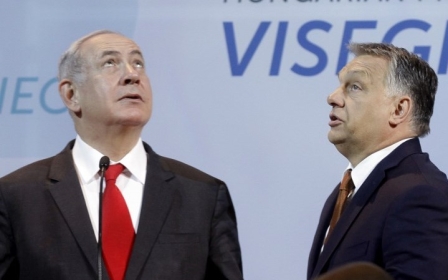Israel is set to ban anti-occupation groups from its schools
Groups critical of Israel’s policies towards Palestinians are set to be barred from visiting schools and speaking to students, after the Israeli parliament passed a new law on Tuesday.
The law, which passed with 43 votes in favour and 24 against in the 120-seat parliament, has been widely criticised by human rights defenders. Critics of the law said that it was a blow to core democratic values such as free speech and part of the Israeli government’s effort to delegitimise rights groups and NGOs.
The amendment to the education act grants new powers to Education Minister Naftali Bennett, head of the religious-nationalist Jewish Home party. Under the amendment, Bennett can now order schools to stop certain groups from giving talks to students.
The legislation has been dubbed the Breaking the Silence law, a reference to the Israeli group of that name which collects and publishes testimony from Israeli veterans about the military’s treatment of Palestinians in the occupied West Bank and the Gaza Strip.
'Organisations that undermine Israel and besmirch IDF soldiers will no longer be able to reach Israeli students'
- Education Minister Naftali Bennett
"Organisations that undermine Israel and besmirch IDF soldiers will no longer be able to reach Israeli students," Bennett said following the parliament's decision.
"Breaking the Silence long ago crossed the red lines beyond legitimate discourse when they started libelling Israel in the international arena. As long as they operate against Israel and the IDF abroad, I won't let them in the education system."
Breaking the Silence said the law is meant to weaken it and other rights groups.
“It’s really about trying to silence and cover up what’s been going on in the occupied territories for 51 years,” said the group’s director, Avner Gvaryahu.
Israel occupied East Jerusalem, the West Bank and the Gaza Strip in the 1967 Middle East war, subsequently pulling out of the latter in 2000. Now Israel enforces a crippling siege on the coastal strip, and has regularly subjected it to devastating conflicts.
Discrediting dissent
Ram Cohen, a headmaster at Tichonet high school in Tel Aviv, said he intended to invite Breaking the Silence to speak again, despite being at risk of breaking the law.
“As a principal, as an educator, it is my duty to stand up and say, 'No more,'” Cohen said. “These laws are meant to harm democracy. I shall not be a part of it. I do not agree with it and I shall object to it.”
'These laws are meant to harm democracy. I shall not be a part of it. I do not agree with it and I shall object to it'
- Ram Cohen, headteacher
Amir Fuchs, who heads the Israel Democracy Institute’s Defence of Democratic Values programme, said the law was part of a wider phenomenon in Israel of trying to discredit dissident groups.
“Education is about thinking critically. It’s about hearing people you don’t agree with. And this is what we want to teach our children,” Fuchs said.
“In order for us to educate our young people to be democratic, to be liberal, they have to hear the other side,” he added.
The effects of Israel’s occupation and siege on children have been a long-debated issue. Earlier this month, a stormy debate on Gaza's children took place in the Knesset, Israel’s parliament, initiated by opposition MKs.
During the debate, four ruling coalition MKs were removed after a confrontation with other lawmakers and left-wing representatives.
Middle East Eye propose une couverture et une analyse indépendantes et incomparables du Moyen-Orient, de l’Afrique du Nord et d’autres régions du monde. Pour en savoir plus sur la reprise de ce contenu et les frais qui s’appliquent, veuillez remplir ce formulaire [en anglais]. Pour en savoir plus sur MEE, cliquez ici [en anglais].




